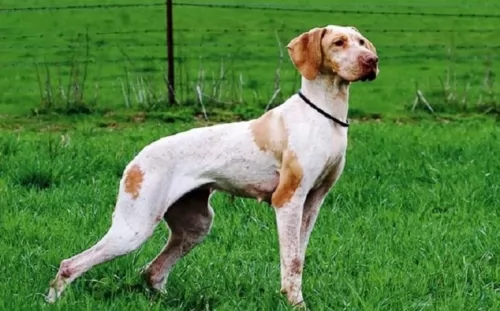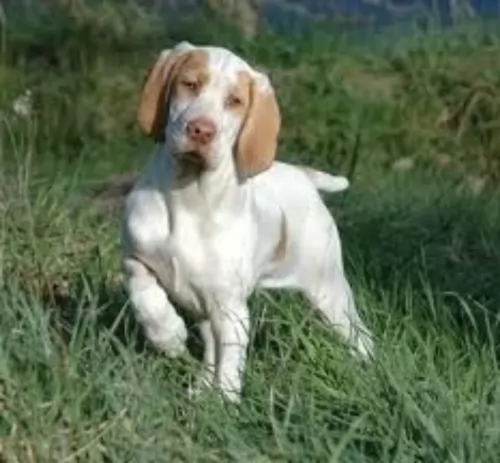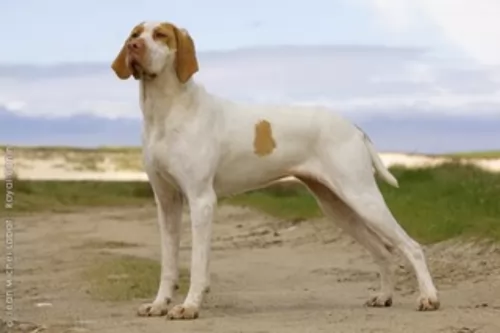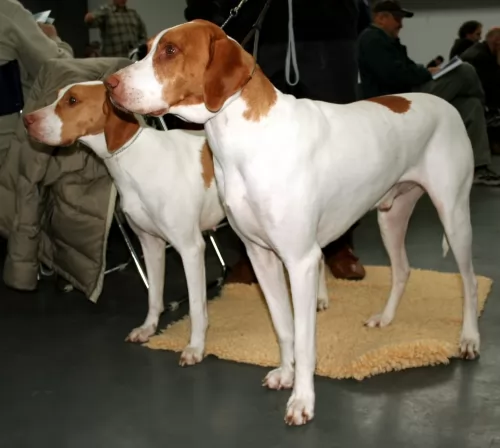 Petzlover
Petzlover Ariege Pointer is originated from France but Peruvian Hairless is originated from Peru. Ariege Pointer may grow 17 cm / 7 inches higher than Peruvian Hairless. Both Ariege Pointer and Peruvian Hairless are having almost same weight. Ariege Pointer may live 3 years more than Peruvian Hairless. Ariege Pointer may have more litter size than Peruvian Hairless. Ariege Pointer requires Low Maintenance. But Peruvian Hairless requires Moderate Maintenance
Ariege Pointer is originated from France but Peruvian Hairless is originated from Peru. Ariege Pointer may grow 17 cm / 7 inches higher than Peruvian Hairless. Both Ariege Pointer and Peruvian Hairless are having almost same weight. Ariege Pointer may live 3 years more than Peruvian Hairless. Ariege Pointer may have more litter size than Peruvian Hairless. Ariege Pointer requires Low Maintenance. But Peruvian Hairless requires Moderate Maintenance
 The Ariege Pointer is a French hunting dog, coming from the Ariegeois region of France.
The Ariege Pointer is a French hunting dog, coming from the Ariegeois region of France.
Known as the Ariege Pointing Dog, French Pointer or Braque de l’Ariege, these dogs came from the old French Braque dogs that were crossed with the orange and white Southern Braques.
It was in 1990 that a team of breeders decided to devote themselves to the breed’s survival. The Braque de l’Ariege was recognized by the United Kennel Club in 2006.
 This is an ancient breed, and he even looks like he comes from ancient times. This particular dog, the Peruvian Hairless, was part of the Inca Empire and it is amazing that depictions of Peruvian hairless dogs have been seen around around 750 A.D.
This is an ancient breed, and he even looks like he comes from ancient times. This particular dog, the Peruvian Hairless, was part of the Inca Empire and it is amazing that depictions of Peruvian hairless dogs have been seen around around 750 A.D.
It is believed the dogs were a meal for many in those ancient times, and that together with the Spanish conquest of Peru resulted in the dog almost being wiped out.
Today the dog is held in esteem in Peru and it is looked upon as the national dog of Peru – an accolade this dog received in 2001. The Federation Cynologique Internationale has accepted this breed and also adopted an official breed standard.
 The Ariege Pointer has always been a dog kept essentially for hunting and not as a companion dog. He stands between 55 – 67cm and weighs 25 – 30kg.
The Ariege Pointer has always been a dog kept essentially for hunting and not as a companion dog. He stands between 55 – 67cm and weighs 25 – 30kg.
He is an attractive looking dog with quite a large head while the body is sleek and slender to look at. The ears are quite large and are floppy while the tail is traditionally docked to give him that distinctive look. These days the tail is often left long and hangs downwards.
The coat is short, single and rough and is white with tan or orange patches. The coat can also be speckled or ticked.
The Ariege Pointer is a hunting dog who is friendly towards strangers and therefore won’t make a particularly good watchdog.
These dog are lively, independent and good natured and they make excellent companion dogs. They are fairly docile and and get on well with children and pets in the home. Just like with any other dog, they need to be trained and socialized early.
 There is no doubt that the most important feature of this dog is its hairlessness, but there is nearly always a little bit of hair on top of its head and on the tip of the tail.
There is no doubt that the most important feature of this dog is its hairlessness, but there is nearly always a little bit of hair on top of its head and on the tip of the tail.
The color of the dog’s skin can be dark brown, mottled or a grey shade. They can be a solid color or grey or brown but with pink spots. The eyes of the dog are brown and the ears can be floppy or erect and the tail is long.
He stands at anything between 25 to 50cm, depending on whether he is a small or medium sized Peruvian. Weights can vary too but can be 4kg for the smaller type, going up to 25 kg for the larger dogs. The dogs are always slim.
Peruvian Hairless dogs love their human families, being somewhat wary around strangers. They are lively, intelligent, alert and protective.
Lean and agile, they can be quick too. Just like with any other dogs, he will require training and socialization if you want him to be obedient and well behaved. He gets on well with other pets in the house and will get on well with disciplined children. This is a quiet dog but even so, he makes a good guard dog.
 The Ariege Pointer has always been an excellent pointing- and hunting dog. When it comes to being a family pet, he puts his hunting skills aside and becomes a loyal, loving, friendly pet.
The Ariege Pointer has always been an excellent pointing- and hunting dog. When it comes to being a family pet, he puts his hunting skills aside and becomes a loyal, loving, friendly pet.
They are considered to be rare dogs, and were at one time bordering on extinction. Those who have owned one of these hunting dogs will be glad to know that they are no longer considered endangered. They’re not your friendly, social kind of dog that you find in other dog breeds, but with training and socialization he will make a fine companion and family friend.
 From ancient times, the Peruvian Hairless has been man’s best friend, and June 12th is the official day of the Peruvian Hairless Dog. These dogs love being surrounded by their human family. They are cheerful, playful, social dogs and they make great playmates for children when the children don’t rough play too much so as to injure him.
From ancient times, the Peruvian Hairless has been man’s best friend, and June 12th is the official day of the Peruvian Hairless Dog. These dogs love being surrounded by their human family. They are cheerful, playful, social dogs and they make great playmates for children when the children don’t rough play too much so as to injure him.
He is also a good watchdog and when he isn’t protecting you or playing he can be calm and quiet, and slot easily into life in the countryside or the city. Treat him well and you'll enjoy excellent friendship from this hairless canine friend.
 The Ariege Pointer is a working dog breed, used for hunting and retrieving prey. With good care the dog can live to be a good 12 – 15 years of age.
The Ariege Pointer is a working dog breed, used for hunting and retrieving prey. With good care the dog can live to be a good 12 – 15 years of age.
However, with every dog breed there are common dog diseases to watch for. This dog has long floppy ears and these can get damp and will need to be cleaned and dried regularly otherwise the long ears can be prone to infection.
Apart from being prone to health issues such as an ear infection, you want to be aware of very common dog ailments such as hip dysplasia which can cause lameness in your dog.
Whatever illness your dog has, and you see he isn’t acting his usual self, get him to the vet for a check-up and then make sure that all treatment and medication prescribed is adhered to.
 Like all breeds there will be some health problems with your Peruvian Hairless, although with good care care this dog can live to be 12 years of age or maybe even a little older. Some things to look out for include -
Like all breeds there will be some health problems with your Peruvian Hairless, although with good care care this dog can live to be 12 years of age or maybe even a little older. Some things to look out for include -
You may notice your dog not eating his food, having an upset stomach and vomiting. Irritable bowel syndrome in a dog is a persistent upset stomach, resulting in diarrhea and bloating. IBS isn’t reserved for older dogs, and it can affect any breed or sex. You’ll notice your pet being listless and without energy. In severe cases of IBS, you may notice blood in your pet’s feces. Don’t allow your canine friend to suffer – get him to the vet.
Also known as epilepsy, it can be disturbing for you to see your canine friend having a seizure. Uncontrolled bursts of electrical activity in your dog’s brain cause these seizures which are a mix of twitching and shaking. The seizure can last for less than a minute or for several minutes. A number of things can cause these seizures in dogs – head injuries, anemia, kidney disease, liver disease, electrolyte problems, brain cancer among others.
Many dogs suffer with one or other skin problems and these can be painful and frustrating. Hairless breeds are more likely to suffer with skin issues and they require special grooming and skin care to prevent dryness, insect bites, sunburn etc.
 Your attractive Ariege Pointer will give birth to 2 – 8 puppies. If you don’t want puppies, then spaying or neutering is excellent and can actually have many health benefits for your pet.
Your attractive Ariege Pointer will give birth to 2 – 8 puppies. If you don’t want puppies, then spaying or neutering is excellent and can actually have many health benefits for your pet.
This dog with its short coat requires very little maintenance, and a good brush twice a week will ensure the coat remains glossy and shiny, giving you the chance to also check for fleas and ticks.
Don’t just assume every dog has bad breath. Bad breath can be indicative of dental disease, and dental problems can cause all kinds of other illnesses within the body. Make sure that while your pet’s teeth are healthy, that you brush them 2 or 3 times a week with special canine toothbrush and toothpaste.
The Ariege Pointer requires regular exercise as it is a lively, energetic dog. He can adapt to life in the city or the country, but ideally he needs a place with a large garden.
Wherever you keep him as a pet, make sure you take him for walks every day and that you play ball- or rope games with him. Ignoring his exercise needs will turn him into a bored, frustrated pet, and that isn’t fair towards him.
Make sure you choose good quality commercially manufactured foods for him. Adding in some home-made food to his kibble such as cooked brown rice, vegetables and chicken will be wonderfully good for him.
Every dog will require some raw meat added into his diet from time to time. Many skin diseases can be treated by adding in raw meat. After all, before dogs were domesticated they lived on raw meat, and including this ingredient back into their diet guarantees to make a remarkable difference in terms of good health.
 For some, the lack of hair is appealing to some people who battle with allergies. The skin of the dog will need to be washed to remove dirt. You’ve got to be careful however, what you wash your dog with because these dogs are known to get blackheads and acne because of blocked pores.
For some, the lack of hair is appealing to some people who battle with allergies. The skin of the dog will need to be washed to remove dirt. You’ve got to be careful however, what you wash your dog with because these dogs are known to get blackheads and acne because of blocked pores.
Then again, the skin can become quite dry, so you need to strike a balance. Talk to a dog expert or your vet on how to care for such a dog’s skin.
You’ll also need to consider your dog when he goes outside into the sun. Protection against sunlight is recommended and once again you might want to find out about sun blocks. Because of the lack of hair, he may also be sensitive to the cold.
Make sure this unusual pet gets the right diet. You want to be sure that whether you feed him commercially manufactured foods or he gets some home-made food it is full of vitamins and minerals. Steer away from spicy, unusual foods as dogs love simplicity and consistency.